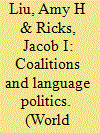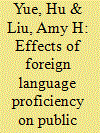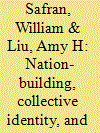|
|
|
Sort Order |
|
|
|
Items / Page
|
|
|
|
|
|
|
| Srl | Item |
| 1 |
ID:
114497


|
|
|
|
|
| Publication |
2012.
|
| Summary/Abstract |
Why is it that some governments recognize only one language while others espouse multilingualism? Related, why are some governments able to shift language policies, and if there is a shift, what explains the direction? In this article, the authors argue that these choices are the product of coalitional constraints facing the government during critical junctures in history. During times of political change in the state-building process, the effective threat of an alternate linguistic group determines the emergent language policy. If the threat is low, the government moves toward monolingual policies. As the threat increases, however, the government is forced to co-opt the alternate linguistic group by shifting the policy toward a greater degree of multilingualism. The authors test this argument by examining the language policies for government services and the education system in three Southeast Asian countries (Singapore, Malaysia, and Thailand).
|
|
|
|
|
|
|
|
|
|
|
|
|
|
|
|
| 2 |
ID:
171196


|
|
|
|
|
| Summary/Abstract |
What explains public attitudes towards a former aggressor state? Conventional wisdom would suggest the prevalence of negative sentiments rooted in historical hatred. In this article we contend that when individuals are proficient in a foreign language—e.g. a lingua franca—they have an alternative channel through which they are exposed to positive narratives put forth by other parties regarding the former aggressor state. And as a result, their attitudes towards the former aggressor state are more positive than those held by their linguistically limited counterparts. To test our argument, we focus on public attitudes towards the Japanese in Mainland China, Singapore, and Taiwan—three Chinese-ethnic majority political units that experienced Japanese aggression leading up to and during World War II. Using survey data, we demonstrate that individuals who are proficient in the English language are much more likely to hold positive attitudes of the Japanese. These results are robust even when we consider whether some individuals are predisposed to being cosmopolitan; whether some individuals have more opportunities to learn English; and whether the linguistic effects are symptomatic of American soft power.
|
|
|
|
|
|
|
|
|
|
|
|
|
|
|
|
| 3 |
ID:
139533


|
|
|
|
|
| Summary/Abstract |
Does language choice attract foreign direct investment (FDI), and if so, how? We argue that language—a dynamic instrument for reducing transaction costs—can influence investors' decision to allocate capital. Potential host countries attract investments by coordinating their domestic language policies—especially those in education—to match the language of the potential FDI investor. We subject our argument to three different tests: (i) a cross-sectional sample of all global Organization for Economic Co-operation and Development investments that employs a newly constructed language-in-education measurement; (ii) a newly assembled time-series cross-sectional data set of all Chinese FDI abroad; and (iii) a detailed case study that uses process tracing to explain Chinese FDI in Indonesia. The results from these tests demonstrate a significant and robust relationship between language and FDI.
|
|
|
|
|
|
|
|
|
|
|
|
|
|
|
|
| 4 |
ID:
114923


|
|
|
|
|
| Publication |
2012.
|
| Summary/Abstract |
The discussion of the place of language in politics has generally revolved around its relationship to nation-building and ethnic conflict. Yet, these are not always causally connected nor is language easily given up for the sake of a greater national or individual good. Attitudes regarding language can be influenced by anticolonialist resentments, memories of past injustice, status paranoia, xenophobia, collective megalomania, religion, ideology, and the desire on the part of a group to base its collective identity on a demarcation from a real or imagined enemy. This applies to many dimensions of language policies, including officialization, alphabetization, gentrification, and glossonym changes. We argue that governments choose language policies for strategic reasons. Whether it is to legitimize or subordinate a language or whether or not the policy is itself the objective, these choices may have unintended consequences.
|
|
|
|
|
|
|
|
|
|
|
|
|
|
|
|
| 5 |
ID:
186566


|
|
|
|
|
| Summary/Abstract |
Anti-corruption efforts are inherently political. Corruption charges can be levied against political opponents as an instrument of repression; they can also be used against troublesome allies in the same party coalition to further consolidate power. In this paper, we focus on Indonesia and ask: Do major corruption charges follow a presidential electoral cycle—and if so, how? We contend charges against prominent members of the government coalition are more likely to happen before an election, allowing the government to replace intra-party rivals with loyal allies. Conversely, charges against prominent opposition members are more likely to happen after an election when fears of retaliation are low, opportunities for credit-claiming are high, and there is an incentive to remove veto players who may inhibit implementing the government's agenda. To test this argument, we use an original, newly assembled dataset of all major corruption charges—i.e., those involving high-profile politicians and garnering international attention—in Indonesia from 1998–2015 as reported in the Associated Press. We find a significant and robust relationship between the electoral calendar and major corruption charges. This relationship is robust across presidential administrations. These results yield insights into how anti-corruption efforts can become a political tool and counsel caution about the effectiveness of “good governance,” especially in new democracies. Finally, we discuss how contextual political factors external to Indonesia's anti-corruption commission, reinforce this empirical pattern.
|
|
|
|
|
|
|
|
|
|
|
|
|
|
|
|
|
|
|
|
|